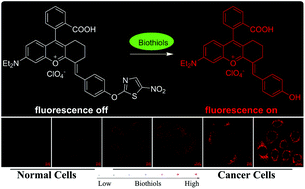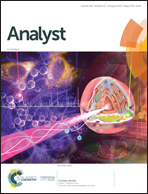A near-infrared biothiol-specific fluorescent probe for cancer cell recognition†
Abstract
Cancer is a global health issue and a leading cause of death. The discrimination of cancer cells from normal cells is of significant importance for the early diagnosis of cancers. As one of the useful biomarkers for developing cancer diagnosis and chemotherapy resistance systems, biothiols not only play an essential role in physiological and pathological processes but also exhibit cytoprotective effects in the susceptibility to carcinogenesis. It would be highly desirable to explore near-infrared biothiol-specific fluorescent probes for cancer diagnosis with outstanding specificity. In this study, a novel near-infrared fluorescent probe BPO-THAZ decorated with thiazole as a recognition site was presented for sensitive and selective detection of endogenous biothiols. BPO-THAZ can be used to not only evaluate the biothiol level in living HeLa cells upon treatment with H2O2 or anti-cancer drugs but also assess endogenous biothiols in stem cells. Furthermore, BPO-THAZ was successfully utilized to discriminate cancer cells from normal cells showing great promise for cancer diagnosis.

- This article is part of the themed collection: Analyst Recent HOT articles


 Please wait while we load your content...
Please wait while we load your content...